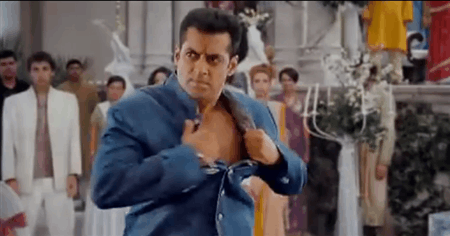Are
you as bored as I am about hearing about Salman Khan? I'm definitely
late to the party with this—my hot take—which is more like
lukewarm take at this point. And yet, we keep circling back to the
question of Salman Khan: is he a good man? Is he a terrible one? Why
does everyone love him so much when all he does and says implies a
basic lack of respect for other people? Perhaps India's biggest
superstar, his fans forgive him everything. Not only do they forgive,
they attack like piranhas in a feeding frenzy if you say anything bad
about him in their presence. “Bhai” is their guru, their idol,
their everything and if you
attack him, you're basically attacking their sense of self.
 |
| Portrait of a Salman fan |
It's
easy to write off the Salman supporters as the lowest common
denominator, to put a little elite angle on the whole thing, “how
could they know any better?” but doing that is dangerous as we see
from Trump's success in the US, the people who support him are
probably the same sort of people who would—if Indian—be Salman
Khan fans. Never dismiss a large group of fans. They're worshipful
and their worship is dangerous.
Khan's
popularity boils down to this—he is an Indian male role model. How
many do we have? Not that many, to be honest. Oh sure, you could want
to be a top businessman, or an author or a newscaster, but none of
them have the sex appeal, the way of looking into your soul and
saying, “I am you”
that Khan does. I'm thinking of some of the boys I went to school
with, how when end of term report cards came in, some of them spent
the entire day in a funk because their fathers would give them a hard
time when they went home. Some fathers—I knew this from playmates'
houses-- existed only to arrive at the dinner table, when all
conversation ceased, when the air grew a bit more tense, when I began
to regret accepting the dinner invitation in the first place. These
men grunted their acceptance of hot rotis, they looked grimly at
their offspring, stroking their mustaches, they nodded politely at my
“hello Uncle” but for a moment, they looked a bit pissed off that
there was a stranger in their house who they'd have to make
conversation with. You spoke in hushed voices around these men, you
made a speedy exit, and your friend understood, because they were
equally dying to go into their rooms and not make eye contact with
this man at all.
The
Indian father of the 1990s, in fact, was much like Kevin Arnold's
father in The Wonder Years,
a
show set in the 1960s. Taciturn, sometimes prone to violence, a man
who seldom laughed, a man who worked hard for his family, but who
didn't show that he loved them in any other way than financial. I was
fascinated by these families, even though I had friends with the sort
of fathers who remembered your name and asked what you were reading.
I was fascinated by the home dynamics, by the fact that these men
literally never apologised. Their word was law, and the people it was
law for worshipped them for it.
My
(very unscientific) theory is that Salman Khan fans come from these
sort of homes. Where their fathers laid down the law with a heavy
hand. Where the mothers blended into the background. To ask a mortal
household god to explain his actions would be as unreasonable as
expecting your Ganesha statue to suddenly start talking. Their
fathers expressed their distrust of feminism and other “high
faluting” words by flared nostrils. I remember watching a video
where a son “pranks” his father by telling him he's gay,
explaining the joke gleefully to the viewers before telling his dad,
who is watching TV with a stone cold face, dressed in a vest and a
lungi. Before he can explain it's a joke, this man rises up and
starts slapping him with an open palm, hitting his son on every part
of his body that he can reach. “No, wait, Papa,” the son keeps
saying, and finally manages to get out, “It's a joke! See, there's
the camera.” The father lowers his hand, glares at us and his son
and walks out.
 |
| Trying to figure it out |
Maybe
I'm wrong, maybe Salman Khan is not their father, but themselves.
“It's a joke,” says Salman Khan when he compares himself to a
raped woman. “The driver did it,” says Salman Khan, when
defending himself against a hit and run charge. You can't slap him,
because it's all so terribly funny, the things we get ourselves into
while trying to please our fathers. So terribly, terribly funny.




No comments:
Post a Comment
Thanks for your feedback! It'll be published once I approve it. Inflammatory/abusive comments will not be posted. Please play nice.